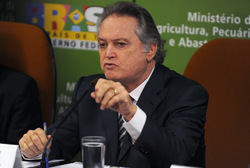Reuters | 2 February 2011 | Português | français
By Raymond Colitt and Peter Murphy
BRASILIA (Reuters) - Brazil, one of the world's top food exporters, sought to downplay fears on Tuesday that it was seeking to block foreign investment in its farmland, saying instead it was looking to ease restrictions for farmers rather than speculators.
While looking to limit land speculation in one of the world's top soybean, beef and sugar exporters, Brazil's agriculture minister Wagner Rossi voiced strong opposition to a recent French proposal to tighten regulation of global commodity markets, which he fears could stifle production.
His comments in an interview come as record grain and livestock prices renewed fears over security of the world's food supplies.
That in turn could fuel a new round of investment in farmland and increase interest in agricultural derivatives, reviving a debate over the role of speculators in commodity markets.
"We want to separate the wheat from the chaff," Rossi said in reference to a planned measure that would distinguish productive from speculative foreign investment.
"There needs to be different treatment for those who add value," Rossi said.
He hoped to have the measure on foreign land regulations in the first half of the year.
The new government of President Dilma Rousseff is seeking to improve the investment climate in Brazil's huge farm sector with measures to cut red tape and grant tax breaks to help offset rising production costs exacerbated by a strengthening currency, Rossi said.
The announcements are likely to please many investors, who were concerned over growing obstacles to tap into the growth potential of one of the world's main breadbaskets.
"The measures pave the way for production increases. It was high time that the country's public sector matched the competitiveness of its farmers," said Normando Corral, vice-president of the agriculture federation in the leading soy producing state Mato Grosso.
"Our bureaucracy is totally incompatible with a modern agricultural power," he said, adding more needed to be done to tackle decrepit infrastructure, lower double-digit interest rates and clarify environmental laws.
Brazil is one of the few countries in the world with huge, unused reserves of arable land. Farmers and ranchers still have access to 120 million hectares of farmable land without cutting down virgin forest, Rossi said.
Brazil would continue to restrict land acquisitions by sovereign funds but welcomed investment that would generate added value, jobs, and export revenues, he said.
Rossi did not say how the government would distinguish between both types of investment but one possibility would be to request a business plan upon purchasing land.
The measure could boost investment in the "under-supplied" sugar and ethanol industry, which has perked the interest of foreign investors. It could also attract capital to the paper and cellulose industry, which Rossi said, had expressed concern over restrictions on foreign land ownership.
MORE PRAGMATISM
Last year the attorney general issued a ruling that limited the area of land foreigners were able to purchase in Latin America's largest country. The move followed growing concern among some government officials over a 'land grab' by foreigners, particularly China.
Rossi, a farmer turned politician, suggested that Rousseff, who took office on January 1, would take a more pragmatic, less ideological approach than that of her predecessor Luiz Inacio Lula da Silva.
While Lula often accused Washington of seeking to undermine Brazil's farm potential through domestic subsidies and tariff barriers, Rossi said he wanted to heighten cooperation with the United States on research and technology.
Brazil's government also wants to cut red tape for farmers, extend credit lines for beef production and is considering tax breaks for coffee producers.
"There is a lot of bureaucracy and bureaucrats," he said, citing steps being taken to eliminate various permits required by farmers.
Brazil also dismissed a French proposal to tighten commodity market regulations which it introduced in January within the framework of G20 discussions.
France's proposal to tighten commodity market regulations was only in the interest of industrial nations importing costlier foodstuffs -- and could stifle output in poorer producer countries, according to Rossi.
(Editing by Lisa Shumaker, Sofina Mirza-Reid, Martin Howell)














